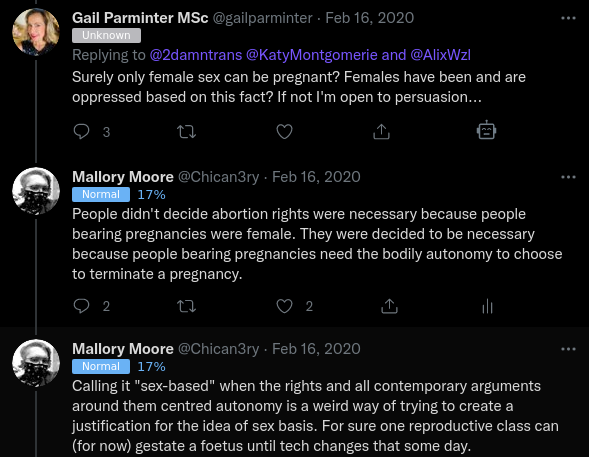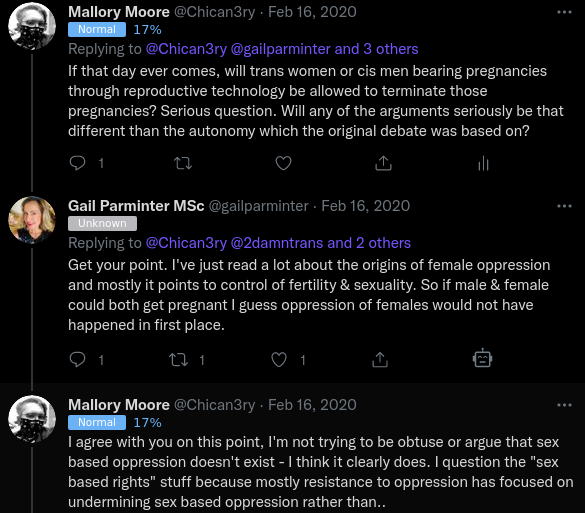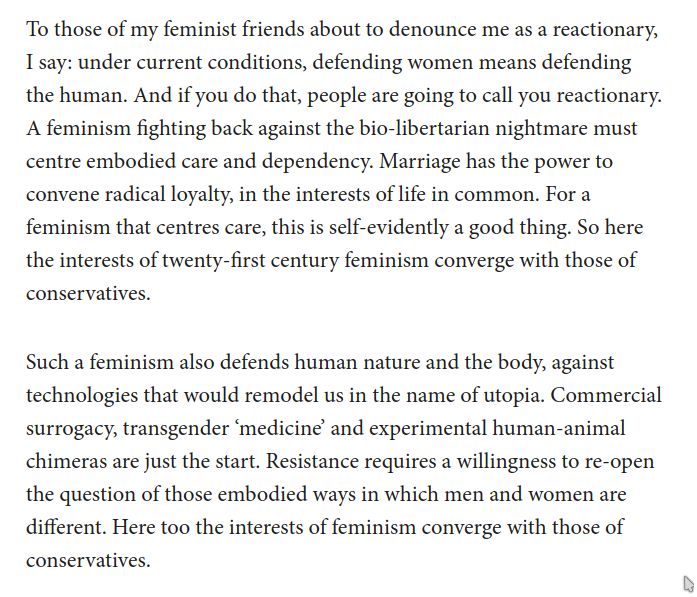How much of a joke is Sex-Based Rights in Feminism?
It turns out, quite a lot actually

Ahead of my point here, the International Human Rights Law scholar (who specialises in sex and gender within IHRL, and especially gender recognition) Sandra Duffy has thrown her expertise into the ring with an absolutely blistering takedown from a legal perspective.
It is important to note from the outset that ‘sex-based rights’ are a fiction with the pretense of legality and do not in fact exist in the manner that the term is used…
Firstly, there are no such thing in IHRL as ‘sex-based rights.’ As explained repeatedly in this post, there are no rights which inhere in a person based on their physical characteristics. There is such a thing as protection from discrimination based on sex,..
Secondly, and rather obviously, lesbians are not a sex class and therefore could not have ‘sex-based’ rights, even if such a thing were possible…
Thirdly, CEDAW itself recognises that the categories of ‘man’ and ‘woman,’ which the Declaration believes to correlate to immutable physical sex, are in fact socially constructed.
I don’t have much respect for “Sex-Based Rights”, I’ll admit it. The concept is absolutely meaningless and should be ridiculed by every feminist worth listening to. I’ve laid out my argument for why a number of times on Twitter and I figured I ought to adapt it for this platform.

My first and foremost problem with it is that sex-based rights invert the reality of almost all anti-discrimination logic that exists in the real world, including the feminist project for women’s liberation generally. Marital Rape was a product of differentiated sex-based rights, male primogeniture is a sex-based right. It’s hard to think of a single instance where different rights applying by sex has ever worked out well for women because the nature of patriarchal discrimination is to make sure that these rights work against women’s interests.
Feminists have known this for decades. In 1974, in the book “Sex Discrimination and the Law”, feminist legal scholars Babcock, Allen and Freedman wrote:
“There is no reason to suppose that the present inferior status of women would materially change through adoption of a constitutional amendment which attempted to maintain a dual system of sex-based rights and responsibilities.”

They compare this, implicitly at least to the “Separate But Equal” concept applied against black people under segregation.
In fact going back through legal scholarly history, it’s really notable how extremely recent the phrase “sex-based rights” is as a feminist rallying cry. The instances before 2014 reveal a great many scholars writing only about the question of the related concept “sex-based rights and responsibilities”.
It’s worth paying attention to how the original term comes from a Christian conservative complementarian perspective which is oriented around the need to deploy state legal authority that discriminates in the fundamental rights and obligations of the person based on sex. The complementarians would say that this is because women are ordained for a different role in life, are better skilled in the kitchen, raising children, are better suited to being virtuous housekeepers while the husband goes out and wins a wage.
As a feminist I have to say this is nonsense. Every single human being on this planet is different in some way from each other. There is no single definitive human experience, nor any average which we should hew a listing of rights or guarantees every individual should expect to be upheld by the wider society. Some rights fundamentally protect some people more than others and that’s great. Everyone can and should benefit from a fundamental right to the degree that they need access to it. Having a right to housing hardly affects the rich who have the means to take or build it without it being withheld by a landlord. Having a right to control your own sexual reproduction (and more widely bodily autonomy) is a right primarily exercised by those who are able to give birth (mainly women!) because of the health risks that come with giving birth, but there’s no special reason why such a fundamental principle shouldn’t be extended to those that don’t. This is great. This is how human rights should work to undercut sources of inequality which inevitably fall on particular groups in society more than others.
It makes a mockery of any comprehensible concept of justice to redefine it in such a way as justice literally means a different set of rights for a woman than might be experienced by a man. Concepts and structures we build to facilitate justice should enable us to determine what is a just outcome between two potentially very different people, based on the common principle that both are people, and taking into account their differences, rather than applying a different law to each. To do otherwise is to make a mockery of the whole concept and introduce second class citizenship to the underclass in the two tier legal system (as we have seen many times throughout history).
A gender critical feminist might well object that they are not a Christian, conservative, or whatever else at this point, and so their conception of sex-based rights for women — special rights for women that are not applied legally to others — is good actually and not harmful.
You’re wrong. I’m sorry. You may not be a Christian. You may not identify yet as a conservative. But the Gender Critical movement are already making a lurch towards the cultural and political movement associated with evangelical conservatism, even if not the theological one.
Right wing provocateur and gender critical “reactionary feminist” Mary Harrington had this to say only last week on the topic.

Conservatism, return to family values and negotiating between men and women an unequal but complementary standing. The Gender Critical project has driven marriage and partnership (the home of 15% of all violent crime in general) as the ideal for feminists, trading freedom for your patriarch’s protection. And obviously the transphobia the piece is based on (and reiterates throughout) is pretty clear.
This was a talk given to the “National Conservatism 2021” conference which only last year the Guardian were berating a Tory MP for attending, for it’s associations with fascist and antisemitic politics. Little coincidence at all that the author Harrington was also recently criticised for her glowing praise for an online antisemitic extremist. She’s hardly a fringe figure in GC either. She is friendly online with senior Guardian staff associated with the Gender Critical movement like Susanna Rustin, she regularly has her essays (including the one the above excerpt was taken from) boosted by Julie Bindel.
Gender critical feminism, and the shift away from fighting against discrimination to calling for women’s “sex-based rights” is a propaganda shift directly targeted at making this inversion of feminist values invisible. Ushered in through the back door is tradition, complementarianism, and completely betrayal of the visions and aims of the historic women’s liberation movement. So far Harrington is one of the few honest enough to admit this, but it’s very obvious from GC Twitter that many other GCs, often career women dissatisfied with middle class life, find the call to reject modernity and embrace tradition appealing.


